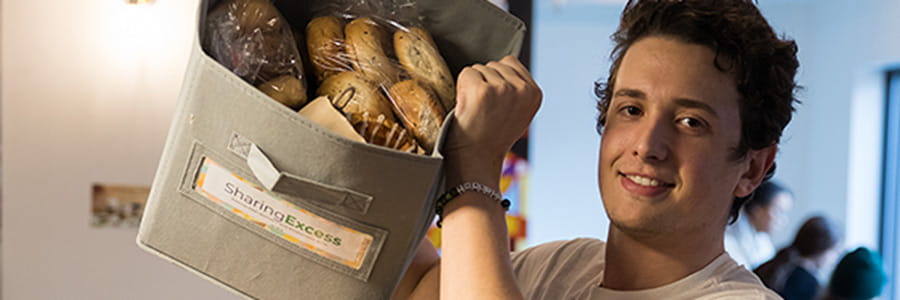Evan Ehlers '19


When the COVID-19 pandemic upended life in the Philadelphia region, Evan Ehlers ’19 was ready to help. The need for extreme social distancing shuttered restaurants and put people out of work – creating the dual challenges of massive food waste and rapidly increasing food insecurity. It was an emergency that Ehlers’ non-profit, Sharing Excess, was perfectly positioned to tackle.
Sharing Excess redistributes unused food from grocery stores, restaurants, university dining halls and other providers to those who need it most, while helping shine a spotlight on hunger and waste in the Philadelphia region. In two weeks in March, as the pandemic escalated, the organization completed about 50 pickups to rescue more than 30,000 pounds of food (safely, with bulk donations of hand sanitizer and latex gloves) and delivered it to its network of hunger relief organizations and community centers.
An inaugural member of Drexel’s Charles D. Close School of Entrepreneurship, Ehlers was a student when he launched the non-profit in 2016. It started as a standardized donation program for his fellow Dragons to reallocate their unused dining plan credits to community members in need.
"Close taught us from the very beginning to see everything as an opportunity, especially if it involves your passions and what makes you happy," Ehlers recalls. "And this ... made me feel the most fulfilled I had ever felt in my entire life."
It started with a gift
That entrepreneurial mindset is exactly what the founding dean of the Close School, Donna Marie De Carolis, wants to bring to every Drexel student. "There is a difference between an entrepreneur — the person — and entrepreneurship — the process," she explains. "Most business schools teach the process of entrepreneurship, but we teach both."
Alumnus and Board of Trustee Vice Chair Stanley W. Silverman ’69, ’74 and his wife, Jackie, were so impressed with De Carolis’ philosophy of entrepreneurial education that they endowed the Silverman Family Professor of Entrepreneurial Leadership, which De Carolis holds.
"We believe in entrepreneurial education for all students because it helps develop a mindset that is creative, innovative and pushes the boundaries of possibilities," Silverman wrote in a blog.
Thanks to the nimbleness and security stemming from her endowed professorship, De Carolis has spearheaded an experiential, interdisciplinary curriculum at the Close School of Entrepreneurship. A unique co-op for startups also evolved in partnership with the Steinbright Career Development Center and the Baiada Institute for Entrepreneurship, an incubator for the entire University that is housed inside the Close School.
We’re now the fast, convenient, agile delivery service that can take leftover food from any grocery store or restaurant and then deliver that to a hunger relief organization or community center in about 30 minutes or less.
With support from donors, the Close entrepreneurship co-op gives students six months of seed capital, workspace, technical support and mentoring. A highly competitive application process determines which ventures have the right combination of student vision and commercialization potential. Ehlers had both.
Unique co-op incubates success
Through the Close School co-op and Baiada’s 360-degree support, Ehlers grew Sharing Excess into what it is today. The organization now works with 40-food industry partners, and seven university chapters, and, even pre-pandemic, had already donated 245,000 pounds of food. It is also Ehlers’ full-time job, employs a team of 10 paid drivers, and engages hundreds of volunteers.
“We’re now the fast, convenient, agile delivery service that can take leftover food from any grocery store or restaurant and then deliver that to a hunger relief organization or community center in about 30 minutes or less,” Ehlers says. “We are able to really mobilize this through the civic engagement and the passion and the energy of college students.”
Sharing Excess’ growing profile has made it a go-to organization for donation partners across the region. In fact, Drexel’s Office of Alumni Relations has turned to the organization to distribute food as part of the annual Alumni Turkey Project. And, as part of the University’s own efforts to provide pandemic-related relief to the community, Sharing Excess delivered 1,200 meals to St. Christopher’s Hospital for Children, which provides care to many patients from underserved communities and is co-owned by Drexel and Tower Health.
As a result, Sharing Excess is one of a handful of organizations the City of Philadelphia is relying on to get food to the people who need it in the coming weeks – and potentially months – of the pandemic. Looking ahead, Sharing Excess will move into a new role within the city’s food insecurity action plan by delivering inventory from some of its larger partners, including the Share Food Program and Philabundance, to established distribution sites where residents in need can pick up food for their household.
Ehlers credits his Drexel education with preparing him to turn his passion and ambition into a venture that is uplifting thousands of Philadelphians in a time of crisis.
“I couldn't think of a better thing to get up for in the morning,” Ehlers says. “I couldn't be happier in the position that I'm in right now. And it's absolutely because of the co-op experience at Drexel — and more specifically, the entrepreneurship co-op experience at the Close School of Entrepreneurship.”
Read more about Ehlers and Sharing Excess on Drexel Now.
Support the Close Entrepreneurship Co-opContact Us
215.895.2612
giving@drexel.edu
Mail your gift to
Drexel University
P.O. Box 8215
Philadelphia, PA 19101-9684
Drexel University Tax ID (EIN): 23‐1352630